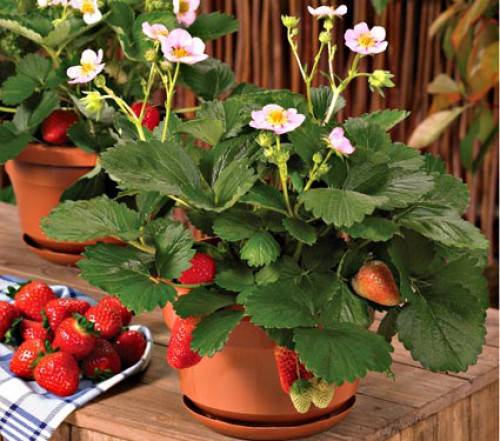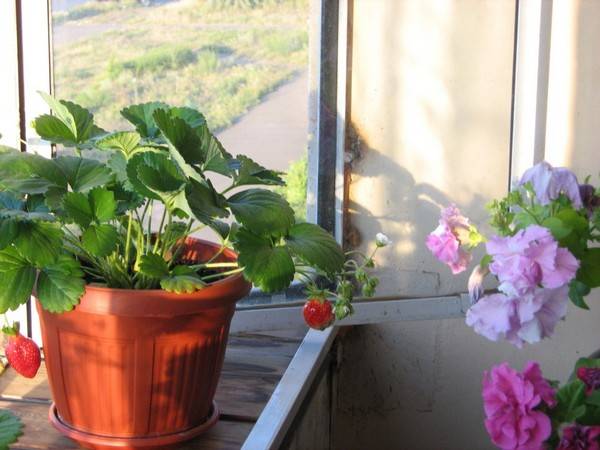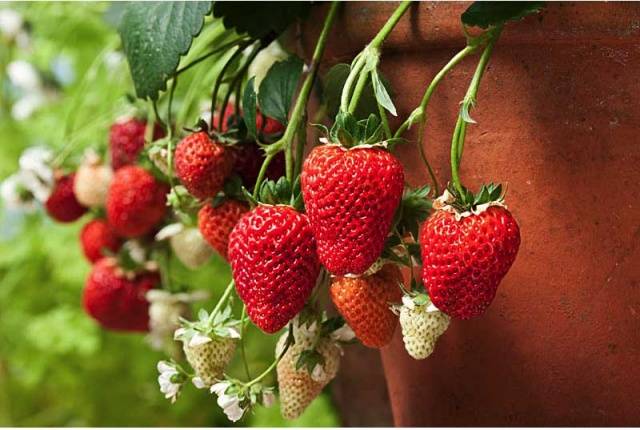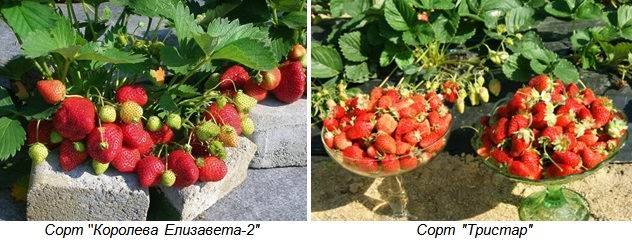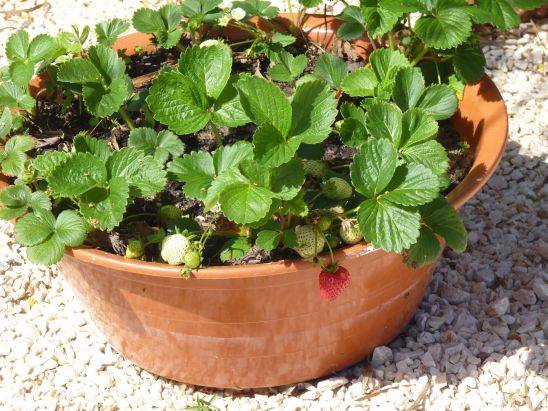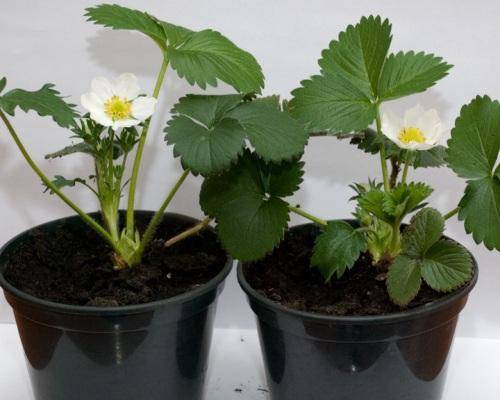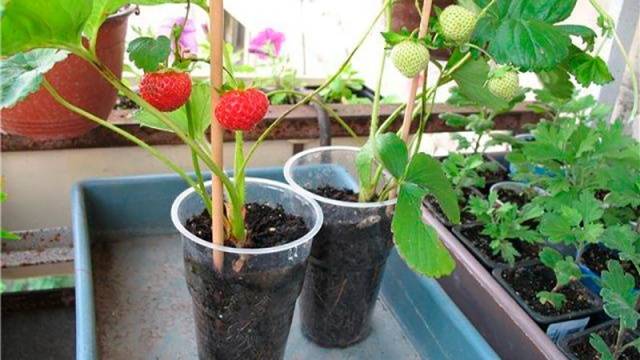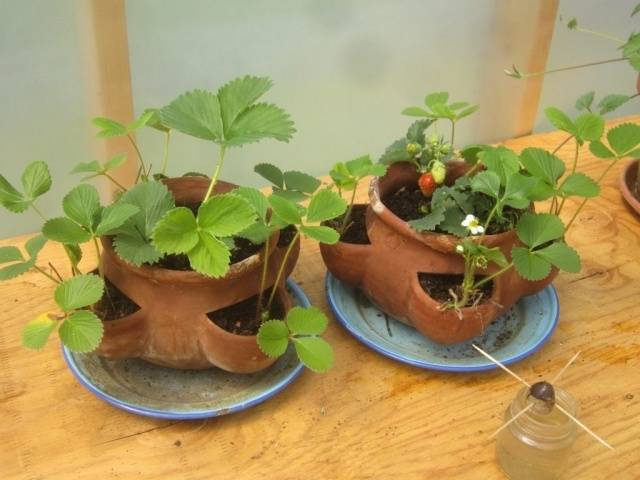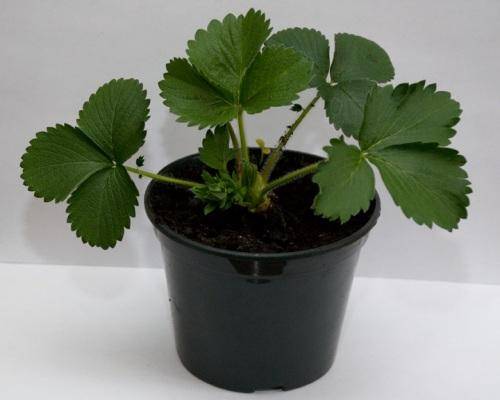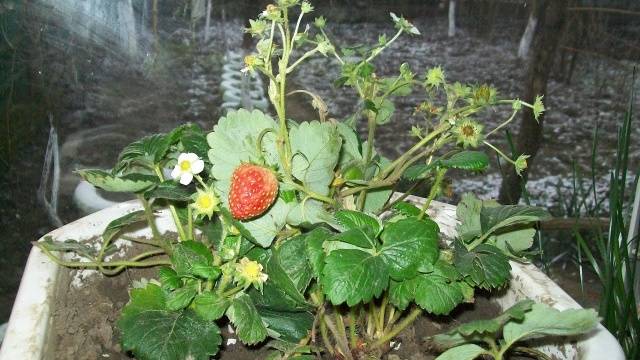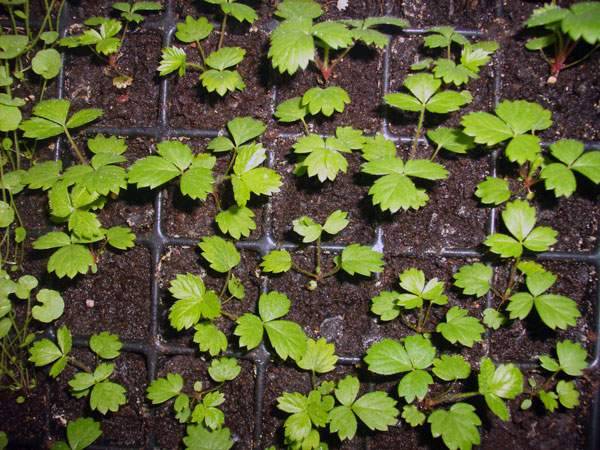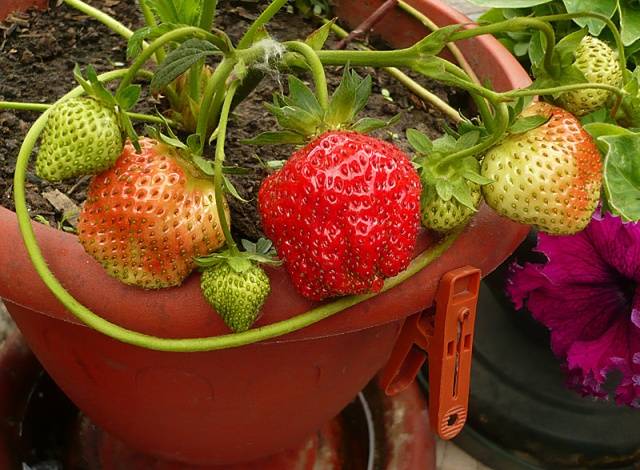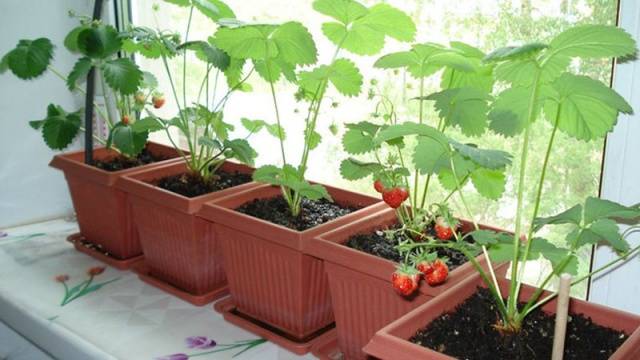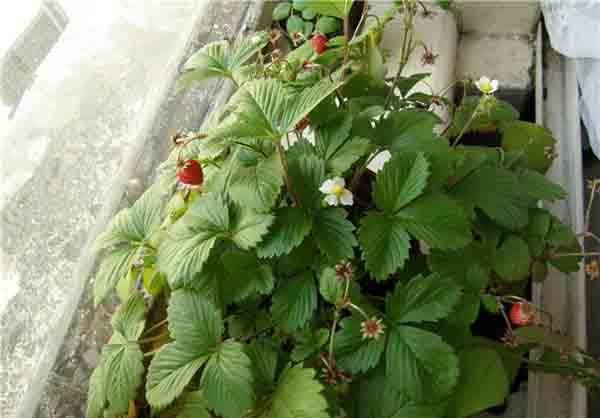Content
Nowadays, indoor crop lovers are rarely surprised by anything, many exotic fruits and berries are grown on window sills and balconies: citrus fruits, kiwi, figs, bananas and much more. Therefore, strawberries on the windowsill are no longer some kind of exotic. Nevertheless, growing this beloved sweet and sour berry with the heady aroma of summer in winter, when there is little sun and heat, and the memories of summer warm any soul, is a rather tempting idea. One has only to bear in mind that strawberries, even in the garden, are not among the problem-free berries, and when grown on a windowsill, they will all the more require increased attention.
Choosing the right variety
Perhaps many have already tried to tame this delicious berry and settle it at home. They usually proceed as follows: they dig out flowering strawberry bushes or even young, recently rooted plants from the garden and, after transplanting them into pots, take them into the house and try to care for them like ordinary indoor plants. Most often, none of these experiments work, and confused gardeners decide that the home conditions are unsuitable for growing strawberries.
In fact, there are many subtleties, and one of them is that not every strawberry variety is suitable for growing in a room on windowsills.
Although there are other varieties of strawberries, remontant ones, which are capable of several waves of fruiting during the year. But even with them, not everything is so simple.
Among them there are the following varieties:
Long day varieties
These plants are able to lay flower buds only with long daylight hours, lasting more than 12-14 hours. They usually bring 2-3 harvests of strawberries per year: from May to September. Moreover, as a rule, later harvests are distinguished by their abundance, the size of the berries and a particularly sweet taste. True, many of them, not withstanding such a load, die, and the next season they must be renewed from young plants. Examples of such strawberry varieties include:
- Garland;
- Crimean remontant;
- Autumn fun, etc.
Neutral day varieties
These strawberry varieties can form flower buds under neutral daylight. Accordingly, they are able to bloom almost continuously and bear fruit for more than 9 months a year. Moreover, fruiting practically does not depend on the time of year and day. These strawberry varieties also do not live long, after 2-3 years they need to be replaced with new plants. It is the neutral day strawberry varieties that are most suitable for growing at home... In recent years, a lot of similar varieties of strawberries, both Russian and foreign, have been bred. Examples include:
- Queen Elizabeth 2;
- Tristar;
- Brighton;
- Geneva;
- Miracle of the world;
- Albion;
- Thelma, etc.
All of these strawberry varieties can be tried at home, although their care requirements may vary.
Alpine strawberry
Finally, there is another group of garden strawberries, which is distinguished, first of all, by its unpretentiousness. She has a minimum amount of maintenance requirements - it is enough just to water it regularly and provide it with additional lighting. These are alpine strawberries or small-fruited repair strawberry... The berries of these varieties are much smaller and more reminiscent of ordinary wild strawberries. They are also distinguished by increased aroma and sweetness. With regular feeding, alpine strawberry bushes are able to bloom and bear fruit for 4-5 years, and only after this period they will require replacement.
And unlike large-fruited varieties of garden strawberries, the seed method of reproduction makes it possible to get plants that are as similar to the mother as possible. Examples of such varieties are given below:
- Baron Solemacher;
- Alexandria;
- Ali Baba;
- Ryugen and others.
How to get planting material
There are several ways to obtain planting material for growing strawberries on a windowsill.
Buying ready-made seedlings
If you have decided on the most suitable strawberry variety for yourself, then the plants can be bought in nurseries or specialized stores. It is best not to buy remontant strawberries in the markets or from random sellers, because the likelihood of getting a regular variety is too high, and also with a low fruiting potential. But if you are confident in the seller's reliability, then buying ready-made strawberry seedlings is the fastest, easiest and most convenient option for obtaining the necessary planting material, however, and the most expensive one.
Own seedlings
If a suitable remontant strawberry variety grows on your site, then it will be most convenient to get your own seedlings, of which you will be sure of the quality, and you will not have to invest anything in it except your own efforts.
There are two technologies for getting your own seedlings.
1 method
It is necessary to wait for the period when the strawberry mother bushes begin to grow with rosettes. This usually happens after the first wave of fruiting.
To get good, abundantly fruiting strawberry seedlings, only the very first mustache should be rooted. Subsequently, their fruit potential decreases sharply. For rooting, prepare containers with holes (disposable cups or pots), fill them with soil mixture. You can take purchased soil and mix it with sand in a 1: 1 ratio, or you can bring earth from the forest.
Gently dig the prepared containers with soil into the ground next to the mother strawberry bushes, so that the edges of the pots are visible and direct a suitable outlet from the first mustache into the pot. Pin it with wire. Perform the same operation with other bushes and rosettes according to the number of strawberry seedlings that you want to receive. Water all the pots with soil regularly, preventing the soil inside from drying out. After about three weeks, the rosettes should be fully rooted - evidence of this will be the new leaves that they form. At this point, the whiskers connecting them to the mother plants will need to be trimmed so as not to weaken the mother strawberry bushes. It is very important to continue regular daily watering of young outlets. It is possible that on especially hot days you will need to water them twice a day.
If buds are formed on young strawberry bushes, it is better to remove them so that the sockets get as strong as possible before the onset of cold weather. It is better to leave the pots in the ground until the first frost. Before the onset of frost, pots with strawberry seedlings are removed from the ground and treated with a weak solution of potassium permanganate.To do this, they are simply immersed in a container of pink solution for 20 minutes. After that, the water is allowed to drain and the pots with seedlings are placed in a place with a temperature of 0 to + 10 ° C for several days. Only after going through the habituation procedure, strawberry seedlings can be brought into the room and placed on the window.
Method 2
Less labor intensive, but strawberry plants spend more time taking root and acclimatizing.
Before the very frosts, it is necessary to dig out well-rooted and developed young strawberry rosettes, remove all dry and damaged leaves from them, but take into account that the plants should have at least three good young leaves. Then processing in potassium permanganate is necessary, as well as in the first case. After that, strawberry bushes are planted in pots with pre-prepared soil.
The land can also be used purchased, or you can bring it from the forest - the main thing is, if possible, do not use the garden land, since it can be infected with nematodes. When planting, you can add a little sand, charcoal and ash to the soil mixture. If there are doubts about the quality of the ground mixture, it would be better to warm it up in the oven or in an oven for disinfection. After warming up, the ground should be treated with a solution of phytosporin in order to "revive" it, that is, to introduce beneficial microorganisms.
After watering, it is advisable to keep strawberry seedlings for some time in cool conditions and only after a few days place them in room conditions on the southern windows.
Growing seedlings from seeds
As already mentioned, some varieties of remontant strawberries can be easily grown from seeds and at the same time get completely identical to the mother plants.
The seeds are usually purchased at the store or isolated from their berries. The soil for sowing seeds should be very light, loose, air and water permeable. You can buy ready-made soil for seedlings, as well as prepare yourself. To do this, it is best to mix in equal proportions peat, leafy earth and sand or vermiculite. Spread the seeds over the surface of the soil without burying or covering them with earth.
The container is closed on top with a film and placed in a warm and bright place. Sprouts may appear in 2-3 weeks. Since they are very small, before the formation of 3-4 leaves, the film should not be removed, but only raised for daily airing. After about a month and a half, strawberry sprouts can be planted in separate containers so that they develop more intensively.
Optimal conditions for fruiting strawberries on the windowsill
Of course, the age of the planting material determines the timing of future fruiting. If you buy already adult flowering strawberry plants, then the berries can be obtained in a month. When growing seedlings strawberry seed the first berries in favorable conditions are formed approximately 6 months after germination. Well, when growing your own seedlings, obtained from strawberry mother bushes, fruiting is specially postponed to allow the bushes to ripen well. In any case, by the New Year it is quite possible to get a harvest of fresh fragrant berries.
What conditions must be created for plants when growing strawberries on a windowsill?
Planting capacity
For a normal and comfortable existence, each strawberry bush needs at least 3 liters of earth. This should be the starting point when choosing pot for its cultivation. Moreover, the roots of strawberries are mostly superficial, so it will be better if it is wider in width than in depth. At the bottom of the pot, it is necessary to provide a drainage layer of expanded clay, pebbles or foam with a thickness of at least 3 cm.
Light and temperature
The most important thing when growing strawberries in a room is lighting that is suitable in intensity and duration. Fluorescent lamps or phytolamps must be turned on for at least 12 hours a day. It depends on the amount of light how sweet the berries will be. Indeed, even on the southern window in winter, strawberries will not have enough light for normal life without additional lighting. The room should not be too hot, the temperature should range from + 18 ° С to + 25 ° С.
To do this, during the flowering of strawberries, a soft brush for drawing is carefully carried out over all the flowers.
Watering, feeding and protection
Watering should be regular, but the ground should not be waterlogged, as strawberries can get sick with gray rot and other diseases.
Strawberries need feeding during the flowering period, as well as after each fruiting wave. You can use both organic fertilizers, such as mullein, bird droppings and humates, and special mineral fertilizers for strawberries.
Of insects for strawberries, only aphids and spider mites can be dangerous in indoor conditions, from which spraying with soapy water and maintaining a moderate humidity of the air helps. You can also use Fitoverm bioinsecticide. And for the prevention of strawberry diseases, it is best to use Fitosporin. It is a biological fungicide, harmless to humans, but quite effective against the main diseases of strawberries.
Let's summarize
Blooming and fruiting strawberries on a windowsill all year round is a very tempting idea, but remember that even the most prolific varieties need rest. For at least two to three months a year, any strawberry should rest. During this period, it is advisable to do without feeding, although watering should still remain regular. The temperature during this time should be maintained at a normal level. Illumination may be quite natural enough if the dormant period is timed to spring or summer.
Thus, getting delicious strawberries on the windowsill at any time of the year is a very real thing if you adhere to all the above recommendations.
